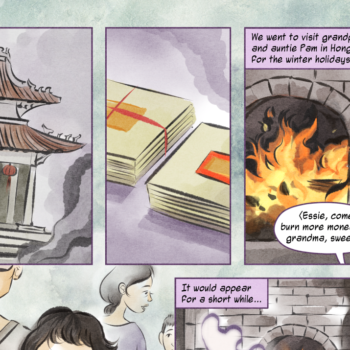
An Interview with Davian Aw
- Posted by Augur Blog
- On November 14, 2018
- 0 Comments
- author interview, LGBT writer, short stories
Since this week we’re celebrating three-issues-worth of Augur Magazine, we caught up with one of our authors from Issue 1.1 to chat about writing grief in fiction, his favourite writing project and his #1 advice to writers on submission.
Davian Aw is a Rhysling Award nominee whose fiction and poetry have appeared in Mythic Delirium, Strange Horizons, The Future Fire, Diabolical Plots and LONTAR: The Journal of Southeast Asian Speculative Fiction, among others. He lives in Singapore with his family and used to have a pet cactus named Arthur.
You can read an excerpt from Davian’s story, “Stay,” here.
Throughout this story there are three pronouns that occupy important roles: the “I,” the “you,” and the “they.” What made you decide to structure the story in this way? Was this conscious?
There was no conscious decision to structure it this way. The first line (“You were every guest on the fourteenth floor”) came to me one day and stuck in my head, and then the rest of the story flowed pretty quickly from there. It felt like a private letter to this other person, where names were not necessary. More than that, I think that using names would have narrowed the scope of who the both of them could be, and given special priority to the surface identities they had in the original world. But the idea was that no matter what they looked like or what roles they played in each of those worlds, those things were irrelevant to the core of who they were, which remained constant.
I thought of everyone else as just an indistinguishable mass of “them”—which might be a dissociation thing in the wake of trauma and grief where it didn’t matter who exactly those other people were.
There’s a deep sadness that permeates this story, and it could so easily have descended into pathos, but instead, the sadness is balanced with sweetness and whimsy. Can you talk about your approach to writing about grief, or writing from the perspective of a grief-stricken narrator?
I’m fortunate to have not experienced much grief from death—the first time I lost someone close to me was in my early 20s. But I’m extremely familiar with the grief associated with loneliness and longing (which I realise is a theme in too many of my stories), and that was my avenue into writing this. As someone who’s part of the LGBT community, I’ve also always been very affected by stories of people who were unable to be with their partners in the hospital during severe illness or at the point of their death, because they aren’t recognised as family no matter how long they’ve been together. So that’s something that ended up making its way into the story.
I was a bit hesitant because it’s not a scenario that’s personally happened to me, and grief and loss are very sensitive topics that I wanted to be respectful about. But as with other topics I don’t have first-hand knowledge of, I try to ground it in similar experiences. In this case, there are the fears of losing a loved one, and not being there while it happens, due to the sort of insidious, mundane evil that emerges from discriminatory laws and regulations—which I can definitely relate to.
There’s been a lot of focus on LGBT rights here in Singapore in the past month or so, over the issue of whether homosexuality should be decriminalised (88% of people say no or are indifferent), and the hatred and especially ignorance in the media and social media has been extremely draining and quite scary. These are the people setting the policies that will affect my life and the lives of people I care about, and for the most part, I’m helpless to do anything about it.
The first couple drafts of this story actually ended a bit earlier and left things hanging in that unresolved grief and longing, which may have been more realistic but didn’t feel satisfactory. And I think having that hope at the end was crucial, because hope is the only thing that keeps us going through the darkness.
Was there a particular hotel room/world that came to you first? And were there any you thought of that you didn’t end up putting in the story? If so, why didn’t they make it in?
I think the first one that came to me was the one with the other person lounging on the bed with the crossword, possibly because it was one of the more typical hotel scenes. There may have been others I thought of that didn’t make it in, most likely because of word count limits and because I didn’t want to detract too much from the story.
How did you start out writing?
I wrote my first story in kindergarten when I was four! It was during a Chinese class and we were supposed to be making picture books, and the teacher got quite angry when I added English words to go along with the pictures. She actually made me erase the words, but it was short enough that I wrote it out again when I got home. (It wasn’t a very good story. There was no plot, and zero character development.)
My fondest writing-related memories are associated with fan fiction, which I got into at 13 on fanfiction.net (and then LiveJournal), and wrote about half a million words of it over the years. Being part of that intensely creative community, reading other fans’ stories and giving reviews on each other’s work taught me far more about writing than school ever did, and I made good friends whom I’m still in touch with to this day.
What have your favourite projects been?
My favourite project from that time is a trilogy of crossover novels—written over five years, with short story spin-offs—wherein various characters get zapped into the real world and trapped in a mysterious hotel which they have to work together to escape, while dealing with massive existential crises about being fictional and being housed with other characters played by the same actor. Hotels pop up a lot in my writing, haha. There’s something transitory and impermanent about them, which I love.
In nonfiction, I was really happy to publish my first book this year, Whatever Commandment There May Be, which challenges the belief that homosexuality is incompatible with Christianity. It’s a topic I’ve been very passionate about and heavily researched for over a decade, and I’m really grateful to my church (the only LGBT-affirming church in Singapore) for their support, and especially to the late Rev. Dr. Yap Kim Hao, who believed very strongly in this book and set aside funds after his death to fully cover the printing costs. (The eBooks are currently free to download at this link with the coupon code ‘FREE’.)
Do you have any advice for people who are just starting to submit?
My advice is to keep writing, keep submitting, and don’t take rejections personally. Perseverance is everything. I’ve done 679 submissions in my life, starting seriously in 2007. Only 61 of those ended up published, most of them only after 2015. That was almost 10 years with close to no results, but I’m very glad I didn’t give up. (And after 600 rejections, I’m mostly immune to them now.)
Try to stick to magazines that pay authors, and submit to non-paying magazines only if they have a wide readership or are prestigious in some way. Basically, you should aim to always get something out of each publication beyond just the thrill of being published. Also, always read the submission guidelines! I just got an acceptance from an editor who thanked me effusively for being one of the few people who actually followed the guidelines. So that likely gave me secret bonus points.
What would you like to see more of when it comes to speculative, dreamy, or vaguely unreal writing?
I love that subgenre in itself, but in terms of what I like to see more — unique worldbuilding, unusual approaches to form.
Why did you send your work to Augur? What made you think we were the right home for your work?
The professional pay rate was a big part of it, to be honest, along with how I’m usually on the lookout for new magazines because there’s less competition and more exposure. At the same time, I very much resonated with Augur‘s mission to make room for a variety of voices and perspectives, and to publish surreal, slipstream fiction, which are among my favourite types of stories and one that not many magazines currently cater to. So this story felt like it would be a good fit, and I’m glad you chose to publish it!
LOVE THIS POST?
Help Augur grow by participating in our Subscription Drive! We’re looking for 75 new subscriptions by November 30. Click the banner below to see the perks & discounts we’re offering!





0 Comments